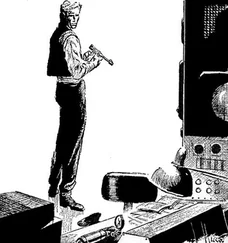Harry Harrison - The Turing Option
Здесь есть возможность читать онлайн «Harry Harrison - The Turing Option» весь текст электронной книги совершенно бесплатно (целиком полную версию без сокращений). В некоторых случаях можно слушать аудио, скачать через торрент в формате fb2 и присутствует краткое содержание. Год выпуска: 1992, ISBN: 1992, Издательство: Viking, Жанр: Фантастика и фэнтези, на английском языке. Описание произведения, (предисловие) а так же отзывы посетителей доступны на портале библиотеки ЛибКат.
- Название:The Turing Option
- Автор:
- Издательство:Viking
- Жанр:
- Год:1992
- ISBN:978-0-670-84528-6
- Рейтинг книги:3 / 5. Голосов: 1
-
Избранное:Добавить в избранное
- Отзывы:
-
Ваша оценка:
- 60
- 1
- 2
- 3
- 4
- 5
The Turing Option: краткое содержание, описание и аннотация
Предлагаем к чтению аннотацию, описание, краткое содержание или предисловие (зависит от того, что написал сам автор книги «The Turing Option»). Если вы не нашли необходимую информацию о книге — напишите в комментариях, мы постараемся отыскать её.
The Turing Option — читать онлайн бесплатно полную книгу (весь текст) целиком
Ниже представлен текст книги, разбитый по страницам. Система сохранения места последней прочитанной страницы, позволяет с удобством читать онлайн бесплатно книгу «The Turing Option», без необходимости каждый раз заново искать на чём Вы остановились. Поставьте закладку, и сможете в любой момент перейти на страницу, на которой закончили чтение.
Интервал:
Закладка:
“I’ll want a say in the decorating.”
“You pick it out — we’ll pick up the tab. Electronic kitchen, Jacuzzi bath — anything you want. The army engineers will install it.”
“Offer accepted. When do I get the catalogs?”
“I have them in my office right now.”
“Ben — you’re terrible. How did you know I would go along with this plan?”
“I didn’t know — just hoped. And when you look at it from all sides it really turns out to be the only safe thing to do.”
“Can I see the catalogs now?”
“Of course. In this building, room 412. I’ll call my assistant and have her dig them out.”
Shelly started for the door — then spun about. “I’m sorry, Brian. I should have asked you first if you need me.”
“I think it’s a great idea. In any case I have some other things to do today away from the lab. What do we say we meet there at nine a.m. tomorrow?”
“Right”
Brian waited until the door had closed before he turned to Ben, chewed his lip in silence before he managed to speak. “I still haven’t told her about the CPU implant in my brain. And she hasn’t asked me about that session where it produced the clue about the theft. Has she mentioned it to you?”
“No — and I don’t think she will. Shelly is a very private person and I think she extends the same privacy to others. Is it important?”
“Only to me. What I told you before about feeling like a freak—”
“You’re not, and you know it. I doubt if the topic will come up again.”
“I’ll tell her about it, someday. Just not now. Particularly since I have arranged some lengthy sessions with Dr. Snaresbrook.” He glanced at his watch. “The first one will be starting soon. The main reason I am doing this is that I am determined to speed up the AI work.”
“How?”
“I want to improve my approach to the research. Right now all that I am doing is going through the material from the backup data bank we brought back from Mexico. But these are mostly notes and questions about work in progress. What I need to do is locate the real memories and the results of the research based upon them. At the present time it has been slow and infuriating work.”
“In what way?”
“I was, am, are…” Brian smiled wryly. “I guess there is no correct syntax to express it. What I mean is the me that made those notes was a sloppy note maker. You know how, when you write a note to yourself, you mostly scribble a couple of words that will remind you of the whole idea. But that particular me no longer exists, so my old notes don’t remind me of anything. So I’ve started working with Dr. Snaresbrook to see if we can use the CPU implant to link the notes to additional disconnected memories that are still in my brain. It took me ten years to develop AI the first time — and I’m afraid it will take that long again if I don’t have some help. I must get those lost memories back.”
“Are there any results of your accessing these memories?”
“Early days yet. We are still trying to find a way to make connections that I can reliably activate at will. The CPU is a machine — and I’m not — and we interface badly at the best of times. It is like a bad phone connection at other times. You know, both people talking at once and nothing coming across. Or I just simply cannot make sense of what is getting through. Have to stop all input and go back to square A. Frustrating, I can tell you. But I’m going to lick it. It can only improve. I hope.”
Ben walked Brian over to the Megalobe clinic and left him outside Dr. Snaresbrook’s office. He watched him enter, stood there for some time, deep in thought. There was plenty to think about.
The session went well. Brian could, access the CPU at will now, use it to extract specific memories. The system was functioning better — although sometimes he would retrieve fragments of knowledge that were hard to comprehend. It was as though they came as suggestions from someone else rather than from his own memories. Occasionally, when he accessed a memory of his earlier, adult self, he would find himself losing track of his own thoughts. When he regained control he found it hard to recall how it had felt. How strange, he thought to himself. Am I maintaining two personalities? Can a single mind have room for two personalities at once — one old, the other new?
The probing certainly was saving a great deal of time in his research and, as the novelty began to wear off, Brian’s thoughts returned to the most serious problems that still beset him on the AI. All the different bugs that led to failures — to breakdowns in which the machine would end up at one extreme of behavior or another.
“Brian — are you there?”
“What — ?”
“Welcome back. I asked you the same question three times. You were wandering, weren’t you?”
“Sorry. It just seems so intractable and there is nothing in the notes to help me out. What I need is to have a part of my mind that is watching itself without the rest of the mind knowing what is happening. Something that would help keep the system’s control circuitry in balance. That’s not particularly hard when the system itself is stable, not changing or learning very much — but nothing seems to work when the system learns new ways to learn. What I need is some system, some sort of separate submind that can maintain a measure of control.”
“Sounds very Freudian.”
“I beg your pardon?”
“Like the theories of Sigmund Freud.”
“I don’t recall anyone with that name in any AI research.”
“Easy enough to see why. He was a psychiatrist working in the 1890s, before there were any computers. When he first proposed his theories — about how the mind is made of a number of different agencies — he gave them names like id, ego, superego, censor and so on. It is understood that every normal person is constantly dealing, unconsciously, with all sorts of conflicts, contradictions, and incompatible goals. That’s why I thought you might get some feedback if you were to study Freud’s theories of mind.”
“Sounds fine to me. Let’s do it now, download all the Freudian theories into my memory banks.”
Snaresbrook was concerned. As a scientist, she still regarded the use of the implant computer as an experimental study — but Brian had already absorbed it as a natural part of his lifestyle. No more poring over printed texts for him. Get it all into memory in an instant, then deal with it later.
He did not go back to his room, but paced the floor, while in his mind he dipped first into one part of the text, then another, making links and changing them — then gasped out loud.
“This has to be it — really it! A theory that fits my problem perfectly. The superego appears to be a sort of goal-learning mechanism that probably evolved on top of the imprinting mechanisms that evolved earlier. You know, the systems discovered by Konrad Lorenz, that are used to hold many infant animals within a safe sphere of nurture and protection. These produce a relatively permanent, stable goal system in the child. Once a child introjects a mother or father image, that structure can remain there for the rest of that child’s life. But how can we provide my AI with a superego? Consider this — we should be able to download a functioning superego for my AI if we can find some way of downloading enough of the details of my own unconscious value structure. And why not? Activate each of my K-lines and nemes, sense and record the emotional values associated with them. Use that data to first build a representation of my conscious self-image. Then add my self-ideal — what the superego says I ought to be. If we can download that, we might be much further on the way toward being able to stabilize and regulate our machine intelligence.”
Читать дальшеИнтервал:
Закладка:
Похожие книги на «The Turing Option»
Представляем Вашему вниманию похожие книги на «The Turing Option» списком для выбора. Мы отобрали схожую по названию и смыслу литературу в надежде предоставить читателям больше вариантов отыскать новые, интересные, ещё непрочитанные произведения.
Обсуждение, отзывы о книге «The Turing Option» и просто собственные мнения читателей. Оставьте ваши комментарии, напишите, что Вы думаете о произведении, его смысле или главных героях. Укажите что конкретно понравилось, а что нет, и почему Вы так считаете.










